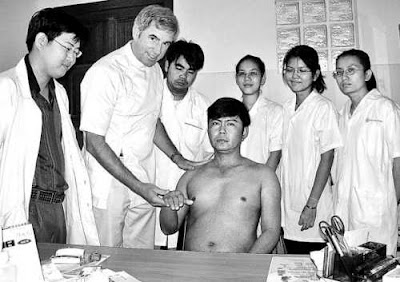 Fri, Jun 11, 2010
Fri, Jun 11, 2010By Yuslina Aziz
AsiaOne
I remember hugging my parents before walking through the immigration gates at Changi Airport, thinking to myself, "How am I going to survive the next fourteen days in Cambodia?"
In retrospect, I felt silly for lacking the confidence and belief that I could serve and volunteer in Cambodia wholeheartedly - for it was me who ended up unwilling to leave the country at the end of my fourteen-day volunteering stint.
Together with twenty-three other team-mates of mine from Nanyang Technological University's (NTU) Hall of Residence 12, I embarked on this inspiring journey, not knowing what to expect but coming out of it with an experience of a lifetime.
We spent a good proportion of our voluntary expedition tutoring Cambodian youths in the English language at the Boys' Brigade Learning Centre (BBLC) in Proyouth Village, Puok District. It was uplifting to discover that over a 6-day period of tutoring; the children absorbed our lessons and even put in the extra effort to practise the phrases and basic terms we taught them through simple games and question-and-answer sessions.
Interacting with these youths also changed my perspective on the value of education and I truly admire them for trying so hard to excel academically and to better themselves in a bid to carve out a brighter future for their families and themselves.
Besides tutoring, we also tried our hand at road-building and it certainly was no easy feat!
Day after day, we toiled under the hot sun, shovelling sand and stones to build the road within Proyouth Village.
It just amazed me that under such circumstances, none of us muttered a single complaint or voiced any forms of discomfort despite our laborious tasks. I only heard words of concern for each other, and the camaraderie we forged over road-building in the village was a highly invigorating affair.
Personally, the highlight of this expedition was our participation in the Rice-Soup Service Programme at Khana Thmey where we played with village children and served bowls of porridge to them.
As English is only taught in schools at the secondary level, most, if not all, the children we interacted with at Khana Thmey spoke no English.
The language barrier proved not to be a problem as all these children wanted was a companion and for someone to hug them and play with them, not worrying if they have food to eat for the day.
All they needed was to feel safe, something we take for granted back at home.
The fourteen days spent in Cambodia was inspiring and uplifting, at best, and not for a moment did I regret my decision to go on this expedition. In fact, you may even see me back in Cambodia next year leading a new batch of undergraduates on another trip.
In retrospect, I felt silly for lacking the confidence and belief that I could serve and volunteer in Cambodia wholeheartedly - for it was me who ended up unwilling to leave the country at the end of my fourteen-day volunteering stint.
Together with twenty-three other team-mates of mine from Nanyang Technological University's (NTU) Hall of Residence 12, I embarked on this inspiring journey, not knowing what to expect but coming out of it with an experience of a lifetime.
We spent a good proportion of our voluntary expedition tutoring Cambodian youths in the English language at the Boys' Brigade Learning Centre (BBLC) in Proyouth Village, Puok District. It was uplifting to discover that over a 6-day period of tutoring; the children absorbed our lessons and even put in the extra effort to practise the phrases and basic terms we taught them through simple games and question-and-answer sessions.
Interacting with these youths also changed my perspective on the value of education and I truly admire them for trying so hard to excel academically and to better themselves in a bid to carve out a brighter future for their families and themselves.
Besides tutoring, we also tried our hand at road-building and it certainly was no easy feat!
Day after day, we toiled under the hot sun, shovelling sand and stones to build the road within Proyouth Village.
It just amazed me that under such circumstances, none of us muttered a single complaint or voiced any forms of discomfort despite our laborious tasks. I only heard words of concern for each other, and the camaraderie we forged over road-building in the village was a highly invigorating affair.
Personally, the highlight of this expedition was our participation in the Rice-Soup Service Programme at Khana Thmey where we played with village children and served bowls of porridge to them.
As English is only taught in schools at the secondary level, most, if not all, the children we interacted with at Khana Thmey spoke no English.
The language barrier proved not to be a problem as all these children wanted was a companion and for someone to hug them and play with them, not worrying if they have food to eat for the day.
All they needed was to feel safe, something we take for granted back at home.
The fourteen days spent in Cambodia was inspiring and uplifting, at best, and not for a moment did I regret my decision to go on this expedition. In fact, you may even see me back in Cambodia next year leading a new batch of undergraduates on another trip.






























